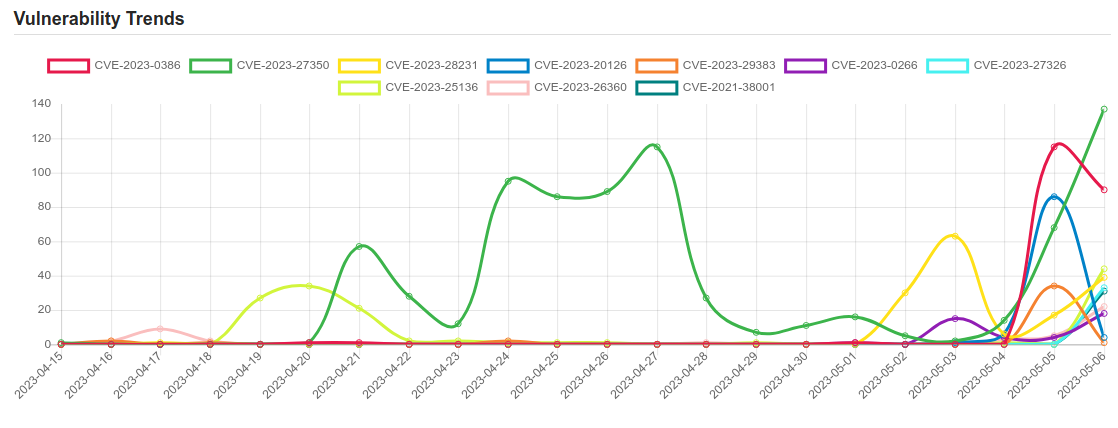Daily Vulnerability Trends: Sun May 07 2023

| CVE NAME | CVE Description |
| CVE-2023-28231 | DHCP Server Service Remote Code Execution Vulnerability |
| CVE-2023-20126 | A vulnerability in the web-based management interface of Cisco SPA112 2-Port Phone Adapters could allow an unauthenticated, remote attacker to execute arbitrary code on an affected device. This vulnerability is due to a missing authentication process within the firmware upgrade function. An attacker could exploit this vulnerability by upgrading an affected device to a crafted version of firmware. A successful exploit could allow the attacker to execute arbitrary code on the affected device with full privileges. Cisco has not released firmware updates to address this vulnerability. |
| CVE-2023-29383 | In Shadow 4.13, it is possible to inject control characters into fields provided to the SUID program chfn (change finger). Although it is not possible to exploit this directly (e.g., adding a new user fails because \n is in the block list), it is possible to misrepresent the /etc/passwd file when viewed. Use of \r manipulations and Unicode characters to work around blocking of the : character make it possible to give the impression that a new user has been added. In other words, an adversary may be able to convince a system administrator to take the system offline (an indirect, social-engineered denial of service) by demonstrating that “cat /etc/passwd” shows a rogue user account. |
| CVE-2023-0266 | A use after free vulnerability exists in the ALSA PCM package in the Linux Kernel. SNDRV_CTL_IOCTL_ELEM_{READ|WRITE}32 is missing locks that can be used in a use-after-free that can result in a priviledge escalation to gain ring0 access from the system user. We recommend upgrading past commit 56b88b50565cd8b946a2d00b0c83927b7ebb055e |
| CVE-2023-27326 | No description provided |
| CVE-2023-25136 | OpenSSH server (sshd) 9.1 introduced a double-free vulnerability during options.kex_algorithms handling. This is fixed in OpenSSH 9.2. The double free can be leveraged, by an unauthenticated remote attacker in the default configuration, to jump to any location in the sshd address space. One third-party report states “remote code execution is theoretically possible.” |
| CVE-2023-26360 | Adobe ColdFusion versions 2018 Update 15 (and earlier) and 2021 Update 5 (and earlier) are affected by an Improper Access Control vulnerability that could result in arbitrary code execution in the context of the current user. Exploitation of this issue does not require user interaction. |
| CVE-2021-38001 | Type confusion in V8 in Google Chrome prior to 95.0.4638.69 allowed a remote attacker to potentially exploit heap corruption via a crafted HTML page. |
| CVE-2023-24749 | No description provided |
| CVE-2023-30777 | No description provided |
| CVE-2021-44228 | Apache Log4j2 2.0-beta9 through 2.15.0 (excluding security releases 2.12.2, 2.12.3, and 2.3.1) JNDI features used in configuration, log messages, and parameters do not protect against attacker controlled LDAP and other JNDI related endpoints. An attacker who can control log messages or log message parameters can execute arbitrary code loaded from LDAP servers when message lookup substitution is enabled. From log4j 2.15.0, this behavior has been disabled by default. From version 2.16.0 (along with 2.12.2, 2.12.3, and 2.3.1), this functionality has been completely removed. Note that this vulnerability is specific to log4j-core and does not affect log4net, log4cxx, or other Apache Logging Services projects. |
| CVE-2022-23808 | An issue was discovered in phpMyAdmin 5.1 before 5.1.2. An attacker can inject malicious code into aspects of the setup script, which can allow XSS or HTML injection. |
| CVE-2022-39048 | A XSS vulnerability was identified in the ServiceNow UI page assessment_redirect. To exploit this vulnerability, an attacker would need to persuade an authenticated user to click a maliciously crafted URL. Successful exploitation potentially could be used to conduct various client-side attacks, including, but not limited to, phishing, redirection, theft of CSRF tokens, and use of an authenticated user’s browser or session to attack other systems. |
| CVE-2023-29489 | An issue was discovered in cPanel before 11.109.9999.116. XSS can occur on the cpsrvd error page via an invalid webcall ID, aka SEC-669. The fixed versions are 11.109.9999.116, 11.108.0.13, 11.106.0.18, and 11.102.0.31. |
| CVE-2023-21839 | Vulnerability in the Oracle WebLogic Server product of Oracle Fusion Middleware (component: Core). Supported versions that are affected are 12.2.1.3.0, 12.2.1.4.0 and 14.1.1.0.0. Easily exploitable vulnerability allows unauthenticated attacker with network access via T3, IIOP to compromise Oracle WebLogic Server. Successful attacks of this vulnerability can result in unauthorized access to critical data or complete access to all Oracle WebLogic Server accessible data. CVSS 3.1 Base Score 7.5 (Confidentiality impacts). CVSS Vector: (CVSS:3.1/AV:N/AC:L/PR:N/UI:N/S:U/C:H/I:N/A:N). |
A considerable amount of time and effort goes into maintaining this website, creating backend automation and creating new features and content for you to make actionable intelligence decisions. Everyone that supports the site helps enable new functionality.
If you like the site, please support us on “Patreon” or “Buy Me A Coffee” using the buttons below


To keep up to date follow us on the below channels.





